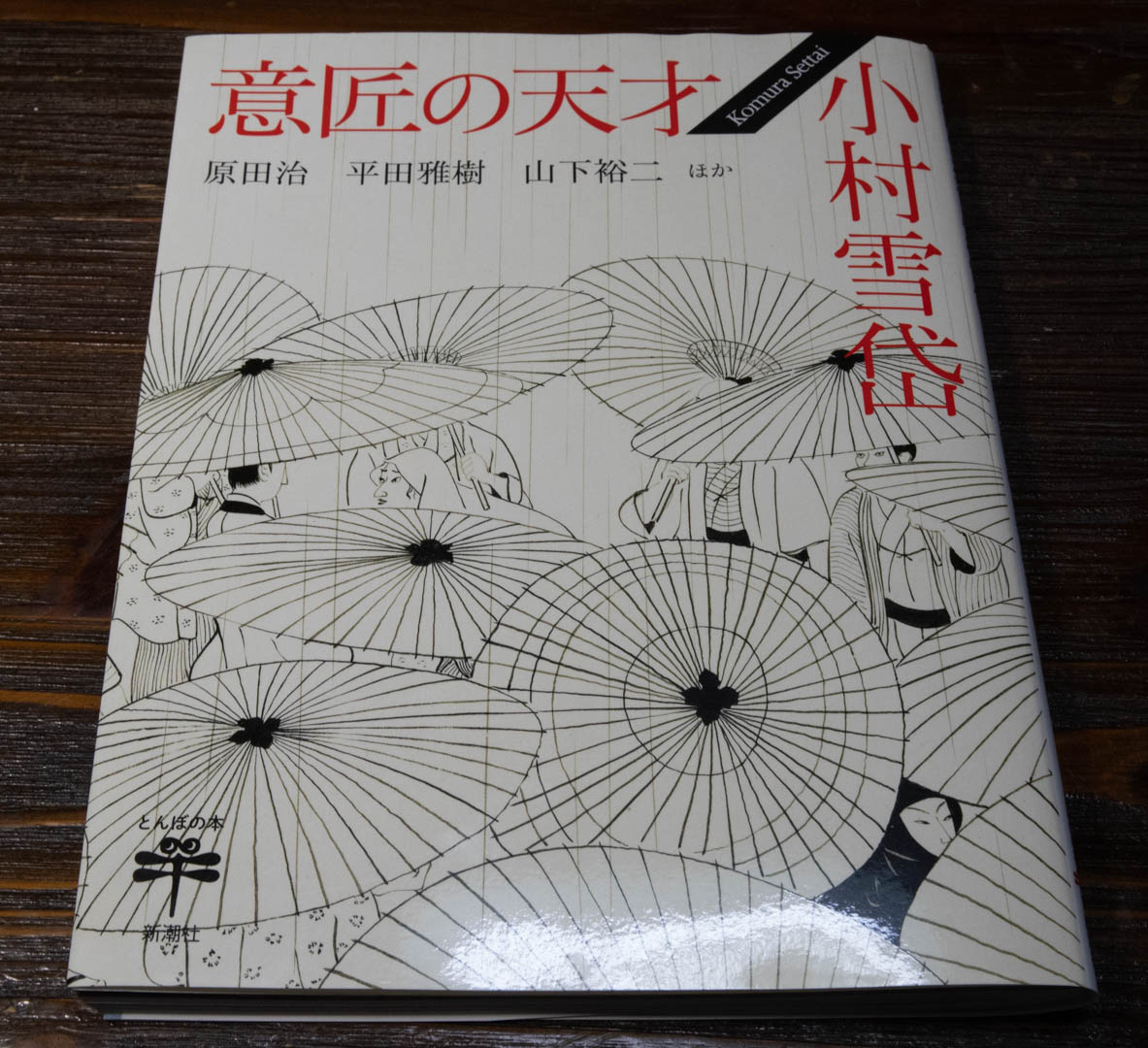 原田治、平田雅樹、山下裕二ほか、による「意匠の天才 小村雪岱」(新潮社、とんぼの本)を読了しました。おそらくこの記事を読まれている多くの方はこの人の名前はあまりなじみがないんじゃないかと思います。私も正直な所まったく知らなかったのですが、白井喬二の作品を探して昭和初期の雑誌を多数古書店サイトで買い、その中の白井喬二作品の挿絵画家としてこの人を知りました。(「若衆髷」、「斬るな剣」など)
原田治、平田雅樹、山下裕二ほか、による「意匠の天才 小村雪岱」(新潮社、とんぼの本)を読了しました。おそらくこの記事を読まれている多くの方はこの人の名前はあまりなじみがないんじゃないかと思います。私も正直な所まったく知らなかったのですが、白井喬二の作品を探して昭和初期の雑誌を多数古書店サイトで買い、その中の白井喬二作品の挿絵画家としてこの人を知りました。(「若衆髷」、「斬るな剣」など)
で「意匠の天才 小村雪岱」という本を買いました。そのタイトル通り、通常の日本画家に留まらず、本の装丁、挿絵、また化粧品の瓶のデザイン、さらには演劇の舞台のデザインまでも手がけた多才な人です。
小村雪岱の才能を見出したのはあの泉鏡花であり、「雪岱」という名前も鏡花が命名したものです。当然のことながら両者が組んだ書籍が何組かあります。雪岱の装丁の特長は、斜めの線をきわめて印象的にうまく使うことと、色、特に青色の使い方のうまさで、特に隅田川を描いたいくつかの装丁にその特長が良く現れています。
一番有名な作品は、邦枝完二が新聞連載した「おせん」の挿絵です。「おせん」のヒロインは、笠森お仙で「江戸の三美人」の一人としてもてはやされて、浮世絵に多く描かれていて有名です。雪岱の描く女性は、ほぼすべてスレンダーで、あまり直接的過ぎない適度な色気が感じられます。
原子力潜水艦シービュー号の”Cave of the Dead”
 原子力潜水艦シービュー号の”Cave of the Dead”を観ました。出ました、またもミイラ男や人魚のWilliam Welchの脚本です。そして今回は「さまよえるオランダ人」です。解説本によると、この人自分の家に幽霊がいる、とか本気で言っていた人みたいで、そういう人にふさわしいオカルト話です。ネルソン提督が第11艦隊の船4隻が行方不明になった海域をフライングサブで調査に行って、激しい雷雨に遭い、その中で空飛ぶ幽霊船を目撃します。その後雷に打たれて飛行不能になったフライングサブが海上に漂っている時に、地図にはない島を見つけ、上陸して調べると洞窟があり、その中に骸骨があり、その骸骨の持っていたナイフをネルソン提督が取ると、さまよえるオランダ人の呪いがネルソン提督に移る、という話です。この後は馬鹿馬鹿しいので省略しますが、ネルソン提督がシービュー号に戻って、クルーが全員白骨になっている幻覚を見るところはちょっと面白いです。
原子力潜水艦シービュー号の”Cave of the Dead”を観ました。出ました、またもミイラ男や人魚のWilliam Welchの脚本です。そして今回は「さまよえるオランダ人」です。解説本によると、この人自分の家に幽霊がいる、とか本気で言っていた人みたいで、そういう人にふさわしいオカルト話です。ネルソン提督が第11艦隊の船4隻が行方不明になった海域をフライングサブで調査に行って、激しい雷雨に遭い、その中で空飛ぶ幽霊船を目撃します。その後雷に打たれて飛行不能になったフライングサブが海上に漂っている時に、地図にはない島を見つけ、上陸して調べると洞窟があり、その中に骸骨があり、その骸骨の持っていたナイフをネルソン提督が取ると、さまよえるオランダ人の呪いがネルソン提督に移る、という話です。この後は馬鹿馬鹿しいので省略しますが、ネルソン提督がシービュー号に戻って、クルーが全員白骨になっている幻覚を見るところはちょっと面白いです。
漱石と牡蠣
夏目漱石が「吾輩は猫である」の中で、主人公の猫が飼い主の苦沙弥先生のことを「牡蠣的主人」(寡黙であまり出歩かないという意味で)と呼んでいますね。ご承知の通り漱石は1900年5月から1902年12月までロンドンに留学しています。その当時は「牡蠣=寡黙、非社交的」のイメージは英語の中で確固としてあったのでしょうね。
==================================================================
彼は性の悪い牡蠣のごとく書斎に吸い付いて、かつて外界に向って口を開いた事がない。
人間もこのくらい偏屈になれば申し分はない。そんなら早くから外出でもすればよいのにそれほどの勇気も無い。いよいよ牡蠣の根性をあらわしている。
主人のようなしなびかけた人間を求めて、わざわざこんな話しをしに来るのからして合点が行かぬが、あの牡蠣的主人がそんな談話を聞いて時々相槌を打つのはなお面白い。
そんな浮気な男が何故牡蠣的生涯を送っているかと云うのは吾輩猫などには到底分らない。
小説中の人間の名前をつけるに一日巴理を探険しなくてはならぬようでは随分手数のかかる話だ。贅沢もこのくらい出来れば結構なものだが吾輩のように牡蠣的主人を持つ身の上ではとてもそんな気は出ない。
「はあ賛成員にならん事もありませんが、どんな義務があるのですか」と牡蠣先生は掛念の体に見える。
原子力潜水艦シービュー号の”The Deadly Dolls”
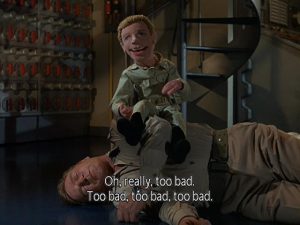 原子力潜水艦シービュー号の”The Deadly Dolls”を観ました。シービュー号のクルーがクレーン艦長とネルソン提督を除いて、あやつり人形の化けたものに入れ替わるという設定で、第3シーズンの蝋人形とまったく同じで芸がありません。しかも蝋人形の時は室温を最大限上げて蝋を溶かして勝ちましたが、今回はバーナーで人形を「焼いて」倒す、というのもまったくひねりがありません。でそれらの人形を操っているのが、謎の宇宙生命体で、ヤドカリみたいに寄生する固い殻を必要としていて、シービュー号をそれにしようとするという話です。クレーン艦長はパペットが化けたクルーに追いかけられてシービュー号の空調ダクトの中を逃げ回りますが、このパターンももう何回目でしょう。何か変なネルソン提督人形がやたらと出てきてしゃべって狂言回しみたいな役を演じますが、だったら人形遣いみたいな教授がいる必要はないんじゃないかと。もしかするとサンダーバードのスーパーマリオネーションへの当てつけかとも思いましたが、サンダーバードは実はアメリカではTV放映されていないので、多分違うでしょう。
原子力潜水艦シービュー号の”The Deadly Dolls”を観ました。シービュー号のクルーがクレーン艦長とネルソン提督を除いて、あやつり人形の化けたものに入れ替わるという設定で、第3シーズンの蝋人形とまったく同じで芸がありません。しかも蝋人形の時は室温を最大限上げて蝋を溶かして勝ちましたが、今回はバーナーで人形を「焼いて」倒す、というのもまったくひねりがありません。でそれらの人形を操っているのが、謎の宇宙生命体で、ヤドカリみたいに寄生する固い殻を必要としていて、シービュー号をそれにしようとするという話です。クレーン艦長はパペットが化けたクルーに追いかけられてシービュー号の空調ダクトの中を逃げ回りますが、このパターンももう何回目でしょう。何か変なネルソン提督人形がやたらと出てきてしゃべって狂言回しみたいな役を演じますが、だったら人形遣いみたいな教授がいる必要はないんじゃないかと。もしかするとサンダーバードのスーパーマリオネーションへの当てつけかとも思いましたが、サンダーバードは実はアメリカではTV放映されていないので、多分違うでしょう。
原子力潜水艦シービュー号の”Fires of Death”
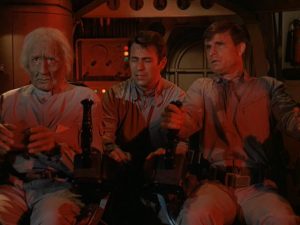 原子力潜水艦シービュー号の”Fires of Death”を観ました。この話から第4シーズンです。第4シーズンになって、荒唐無稽さは更にパワーアップし、今回は何と中世からずっと500年も生きている錬金術師の話です。シービュー号がある火山学者と、爆発を繰り返している火山に向かいます。その火山が本格的な大爆発を起こすと、南半球全体に大被害が及びます。しかしその火山学者は爆発を止めようとしていたのではなく、実は中世から生き延びている錬金術師で、非金属を金に変え、また自分の生命を永遠に出来るエリクシールという石を、火山の爆発によって火山から発生させようとします。その錬金術師は怪しげな装置で、人を「黄金人間」に変えてしまっており、その手下の黄金人間が錬金術師の手助けをします。最初の黄金人間はしかし、火山の中で頭を撃たれて動けなくなりますが、錬金術師は今度は副長のモートンを黄金人間に変えて自由に操ります。(クレーン艦長は今回は何故か頭を強く打って気絶した、ということでストーリーに絡みません。)
原子力潜水艦シービュー号の”Fires of Death”を観ました。この話から第4シーズンです。第4シーズンになって、荒唐無稽さは更にパワーアップし、今回は何と中世からずっと500年も生きている錬金術師の話です。シービュー号がある火山学者と、爆発を繰り返している火山に向かいます。その火山が本格的な大爆発を起こすと、南半球全体に大被害が及びます。しかしその火山学者は爆発を止めようとしていたのではなく、実は中世から生き延びている錬金術師で、非金属を金に変え、また自分の生命を永遠に出来るエリクシールという石を、火山の爆発によって火山から発生させようとします。その錬金術師は怪しげな装置で、人を「黄金人間」に変えてしまっており、その手下の黄金人間が錬金術師の手助けをします。最初の黄金人間はしかし、火山の中で頭を撃たれて動けなくなりますが、錬金術師は今度は副長のモートンを黄金人間に変えて自由に操ります。(クレーン艦長は今回は何故か頭を強く打って気絶した、ということでストーリーに絡みません。)
この話は、荒唐無稽ながら、火山のセットは非常に良く出来ていて、70年代になってパニック映画の巨匠となるアーウィン・アレンの片鱗が出ていて、それなりに楽しめます。結局ネルソン提督が火山の中に水爆をセットし、その爆発のパワーで火山の噴火を止めます。
“An oyster of a man”の出典
「新々英文解釈研究」の最初の方に出てくる、”He is an oyster of a man.”の出典と思われるものを突き止めました。(OEDでのoysterやclamで「寡黙な人、非社交的な人」という意味の用例がマーク・トウェインが多かったので、最初マーク・トウェインの何かの作品かと思って、マーク・トウェイン作品のテキストが検索出来るページで調べましたが見つかりませんでした。)John Dunlopというスコットランドの詩人(1755 ー 1820)の書いた歌詞の中に”an oyster of a man”が出てきます。しかし、これは1812年の「ジョージ・マッカルがグラスゴーの『牡蠣クラブ』から引退するにあたって」という歌であり、かなり特殊な文脈で使われていることが確認出来ます。しかもおそらく、ジョージ・マッカルという人は何らかの理由で、「牡蠣クラブ」から引退(または退職)するのであり、そこで「牡蠣のような人」というのは「牡蠣クラブを象徴するような人(または常連客、あるいは従業員)」という意味でほとんどジョーク的に使っていると考えられ、「寡黙な人」という意味ではないように思います。歌詞の中に「白鳥のように自分自身のレクイエムを歌う」とありますから、ますます無口であるという解釈はおかしいです。それに「牡蠣クラブ」はおそらく美味しい牡蠣を食べながら社交を楽しむ人の会かあるいはオイスター・バーの名前ではないかと推察されます(現在でも同名のオイスター・バーが各地にあります)ので、まったくもって「寡黙な人」はおかしいと思います。ちなみに、歌詞の中の”Tiny Lochrians ! huge Pandores !”はどちらも牡蠣の品種だと思います。(前者はOEDに載っていませんが多分「Ryan湖(Loch Ryan、塩水湖)の牡蠣」ということだと思います。18世紀の始めから牡蠣の養殖場で有名のようです。後者は”A kind of large oyster found in the River Forth, esp. near Prestonpans.”とあります。)ジョージ・マッカルは、そういう色んな牡蠣に愛される人間だけど牡蠣みたいな人、って言っているんでしょうね。調べてみたらスコットランドのグラスゴーは今でも牡蠣で有名で色んなオイスター・バーやレストランがあり、そういう町で「牡蠣のような人」というのがネガティブな意味では決してないと思います。
John Dunlop (writer)
https://en.wikipedia.org/wiki/John_Dunlop_(writer)
“Dunlop of that ilk : memorabilia of the families of Dunlop … ; with the whole of the Songs ; and a large selection from the poems of John Dunlop”
ON GEORGE M’CALL RETIRING FROM THE “OYSTER
CLUB” IN GLASGOW (1812).
[His letter of demission ended with four verses wretched poetical lines.]
The Oyster Club, in sable clad,
Laments for George M’Call,
Who, swan-like, his own requiem sings.
Weep ! Weep ! ! ye oysters all.
Tiny Lochrians ! huge Pandores !
Forget him, if you can ;
He was, creation must confess,
An oyster of a man ! !
拙試訳
牡蠣クラブ、喪服を着て
ジョージ・マッカル氏を悼む
氏は、白鳥のように、自分自身のレクイエムを歌う
ああ悲しい、悲しい、牡蠣のみんなよ
小さなリャン湖の牡蠣、大きなパンドレス牡蠣よ
もし可能なら彼を忘れよう
氏は、創造主は告白しなければならないが、
まさに人間牡蠣だった。
NHK杯戦囲碁 瀬戸大樹8段 対 林漢傑8段
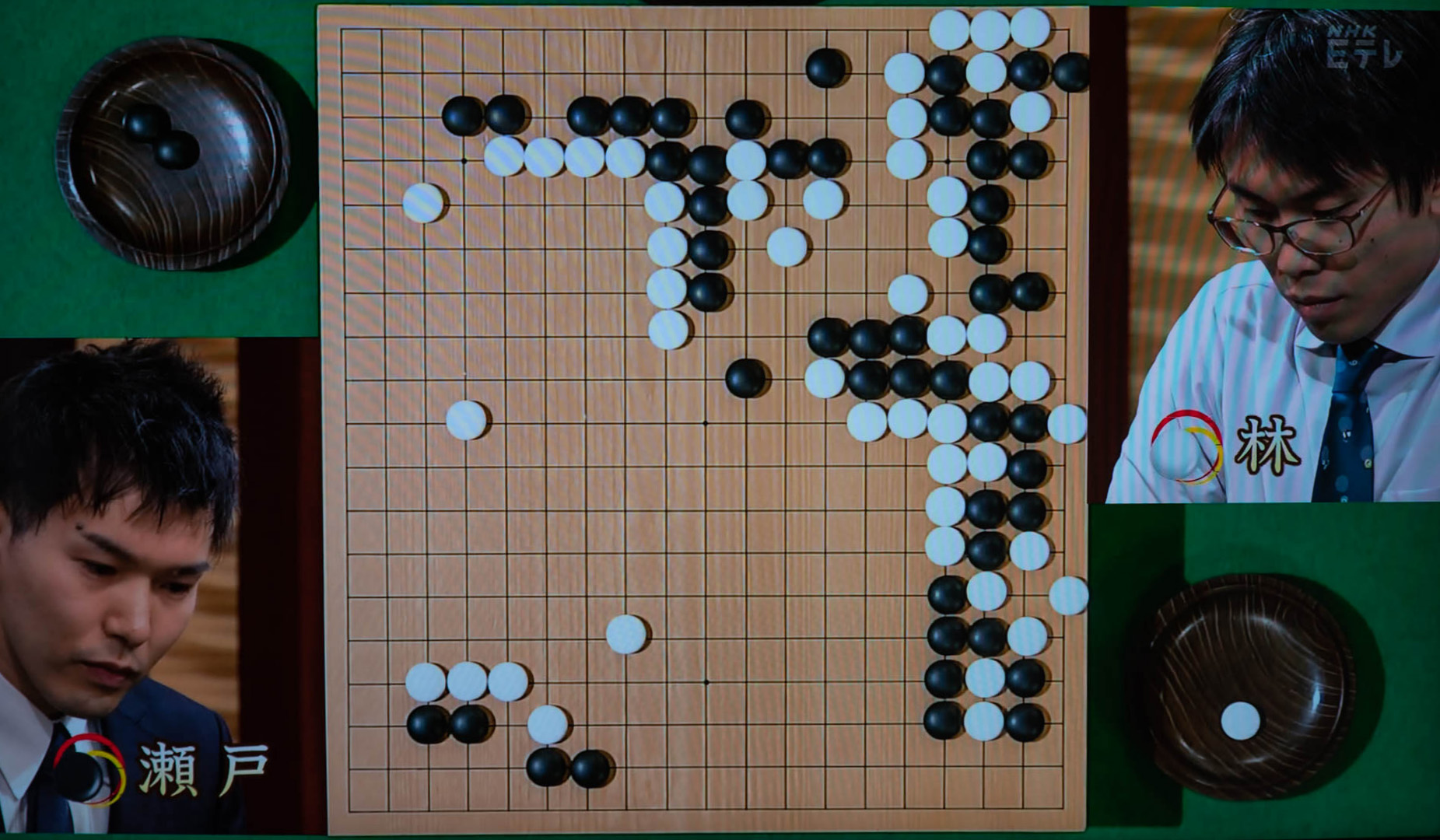
本日のNHK杯戦の囲碁は黒番が瀬戸大樹8段、白番が林漢傑8段の対戦です。布石は4隅で定石(但し今風)が進行しましたが、黒が左下隅でダイレクトに三々に入った結果、左辺は白の大きな模様となりました。黒は左辺に侵入せず、上辺から押していって左辺を囲わせ、その代わり右上隅に上辺から掛かりっぱなしになっている白2子を孤立させこれを攻める作戦に出ました。白はそれを承知で左辺をぎりぎりまで受け続けました。いよいよ取られかねないというタイミングで白は右上隅を動き出し、黒の断点を覗きました。ここでの折衝で白は中央の黒の切断や右上隅の黒への圧力などを上手く使い、結局右辺で一手寄せ劫に持ち込みました。この劫が黒が右上隅を活きにいった関係で白が一手ダメを詰めることが出来、本劫になりました。白は周辺に劫立てが多く楽な劫争いで、結局白は劫に勝ち黒6子を取ってしのぐという、白から見て上々のシノギとなりました。黒は代償で左辺の白模様を侵略しましたが、ある意味地だけの問題で、形勢は白のリードでした。その後下辺でまた劫争いが始まりましたが、白は左辺の地を減らされた代償に左下隅で地を稼ぎ、白のリードは変わりませんでした。最後ヨセで若干白のミスがあったので差が縮まりましたが、結局白の2目半勝ちに終わりました。
Festivals (Senteisai in Shimonoseki city)
The following essay is what I wrote as an assignment for a writing course at an English school AEON:
Topic: Festivals
Style: Casual
I would like to introduce a famous festival held during the so-called golden week in Shimonoseki city, my birthplace. The name of the festival is Senteisai (a festival for the passed emperor) held from May 2 to May 4. The purpose of the festival is to pacify the spirit of the emperor Antoku who died young in 1185.
In late 12th century Japan, two dominant samurai families, Genji and Heike fought each other trying to get the governance of Japan. The battle of Dannoura was the last one where Genji defeated Heike completely on the Kanmon channel. It was a naval battle where many ships of the both sides fought on a very narrow channel called Kanmon channel between Honshu and Kyushu. In the first stage of the battle, Heike had superiority, but because of the change of tide, Genji finally destroyed most ships of Heike. The emperor Antoku, who was a grandson of Kiyomori Taira of the Heikes and was just 6 years old at the battle, was getting on a ship with some female retainers. Most remaining samurai and retainers drowned themselves. The young emperor asked to a female retainer where they would go. She replied that they would go to the paradise and there was another metropolis at the bottom of the sea. Then, she brought him into the sea.
Some menials were drawn up from the sea and survived. Many of them were forced to do prostitution to make a living. Later they started to hold a festival to comfort the spirit of the late emperor. That was the start of Senteisai. The most spectacle attraction on the festival is a parade of beautifully attired geisha girls called “joro dochu”. (Joro is another name of geisha in Japanese.)
It is alleged and also believed that it surely rains on at least one day among the three. We call it the tears of Heike people.
Lafcadio Hearn, aka Yakumo Koizumi in Japan, wrote a story of Miminashi Hoichi (Hoichi the earless). Hoichi was blind and was a story teller of the battels between Genji and Heike, accompanied by the biwa, a Japanese lute. He was favored by some ghosts of Heike. Whenever he told the story to them, all the ghosts cried harshly at the scene of the death of the young emperor. A famous priest tried to save his life and wrote holy scripts of Buddhism on all parts of his body. But because the priest failed to write them on Hoichi’s ears, his ears were found and taken by the ghosts. He survived, but later he was called Miminashi Hoichi, Hoichi the earless.
「新々英文解釈研究」の奇妙で時代がかった英語
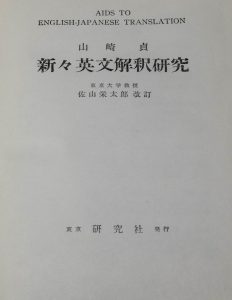 「新々英文解釈研究」のおかしな所は、ごく普通の表現を十分マスターしていない人に、いきなりかなり奇妙な、レトリックで言えば「文飾」(figures)的な表現を教えることです。例えて言うならば、直球もまともに投げられない初心者の選手にいきなりフォークボールやナックルのような変化球を教えようとする野球のコーチに似ています。更に別の面では日本語を教えるのに時代劇の日本語で教えようとするのにもちょっと似ている所があります。
「新々英文解釈研究」のおかしな所は、ごく普通の表現を十分マスターしていない人に、いきなりかなり奇妙な、レトリックで言えば「文飾」(figures)的な表現を教えることです。例えて言うならば、直球もまともに投げられない初心者の選手にいきなりフォークボールやナックルのような変化球を教えようとする野球のコーチに似ています。更に別の面では日本語を教えるのに時代劇の日本語で教えようとするのにもちょっと似ている所があります。
(5-b) He is the incarnation of avarice.
ともかく、incarnationが大仰で時代がかっています。incarnationとは例えば神の子が人の肉体を得てこの世に現れた、とかそういうことです。reincarnationは輪廻で生まれ変わること。
He is truly a greedy man. とかで十分だと思います。
(17-a) I do not love him the less for his faults.(彼には欠点があるがそれでも好きだ。)
多分口頭で言ったら多くの人に意味が通じないでしょう。
I love him none the less for his faults.の方が普通と思います。
(22-a) I am only too delighted to accept your kind invitation.(大喜びでご招待に応じます。)
実際の場面でこういう表現を使うと、それはほとんどジョークとしか受け入れられないと思います。敢えて日本語に訳すのであれば、「お招きに預かり恐懼感激に御座候。」といった感じでしょうか。
I
(24-b) We have two dogs, a white one, and a black one; the one is larger than the other.
このthe oneが前者で、the other が後者という説明になっています。ですがこれを口頭で言われたら、ほとんどの人にどちらがどちらか分からないでしょう。こんなものを覚える暇があったら、the former, the latter という「普通の」表現をまず覚えるべきです。
(65-a) I have a liking for that man.
これについては、かなり口語的な表現に聞こえます。
以前「謎の円盤UFO」で”I’ve no liking for you blacks.”という強烈な人種差別発言が出てきました。
この参考書の改訂者のコメントに「英作文にも役に立つ」とありましたが、とんでもないと思います。(敢えて言えば、確かに昔の大学受験の奇妙な英作文には有用だったかもしれませんが。)
通じない英語をせっせと教えている本にしか見えません。
私は、この本の初版とほぼ同じ時期に出版された、芳賀矢一・杉谷代水合編「書翰文講話及び文範」という、手紙の文例集を持っています。この本は昔の候文の文例が沢山載っている貴重な書物ですが、しかしながらこの文例集に載っているものは現代の手紙で使うことはほぼ100%無理です。日本語ですらそうなのに、英語でこの本が今でも使えると思っている人がいることは信じられないです。
原子力潜水艦シービュー号の第3シーズンのまとめ
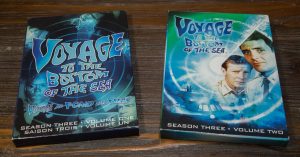 原子力潜水艦シービュー号の第3シーズンのまとめです。全26話。
原子力潜水艦シービュー号の第3シーズンのまとめです。全26話。
ともかく、第2シーズンまでに比べると、ガクッとストーリー展開の質が落ちるのがこの第3シーズンです。
Wikipediaによると、アーウィン・アレンが「宇宙家族ロビンソン」で内容を子供向けに、宇宙人とか怪物の登場を増やして視聴率を上げることに成功したのに気をよくして、原子力潜水艦シービュー号でも同じことをして、こちらでは失敗したものです。
ともかく、潜水艦の中に登場する必然性のまったくない、狼男だのミイラ男だの人魚だの化石男だのが登場し、そのためにかなりのこじつけ的なお話が作られています。
また、奇妙で非合理的なシーンが連続する理由については、幻覚だったとか、集団催眠術だったとか、ともかく馬鹿馬鹿しくて幻滅します。
さらには、シービュー号の原子力エンジンについては、第2シーズンまでは一度も登場せず、シービュー号って本当に原子力潜水艦?って思ったぐらいですが、この第3シーズンでは最初の方で登場し、以後これでもか、というぐらい頻繁に登場します。しかしその原子力エンジンの描き方も相当変で、クルーが制御棒を何の防護服も無しに「素手で」引き抜いたり、また原子力エンジンがオーバーヒート、それはつまりメルトダウンの筈ですが、爆発を起こしているのに、何故かそれが簡単に修理出来たり、もう無茶苦茶です。
またエイリアンも良く登場しますが、同じ時代の円谷プロの特撮に比べたら、本当に子供だましの特撮で、エイリアンがきわめてチャチです。
後、以前日本で有数の絶縁物の会社に勤めていた私としては、シービュー号がちょっと何かがぶつかったぐらいで盛大に火花が飛んで各所が爆発して火災になるのが信じられません。しかもかなりの盛大な爆発でも、その後簡単に修理出来たりします。
また、シービュー号に侵入した何かが、大体において、Circuitry Room(回路室)に入り、そこの配線を破壊してシービュー号がコントロールを失うというのが良く出てきます。そんな大事な部屋なのに、何故か鍵もかかっておらず、また見張りも一人もいません。更には普通制御盤というのは鍵のかかるキャビネットの中に実装されていますが、シービュー号の配線関係はすべて剥き出しで露出しており、それにダメージを与えるのは極めて簡単です。
良くこの内容で打ち切りにならなかったのが不思議ですが、ともかく第4シーズンが後26話残っています。
Monster from the Inferno 宇宙から来た巨大な脳
Werewolf 狼男
The Day the World Ended 集団催眠術を操る男
Night of Terror 恐竜の島、幻覚
The Terrible Toys エイリアンが操る恐怖のオモチャ
Day of Evil エイリアンがネルソン提督に化けてアメリカの太平洋艦隊を核ミサイルで攻撃
Deadly Waters 深海ダイバーのコワルスキーの兄
Thing from Inner Space 半魚人みたいな海の怪物
The Death Watch サブリミナルメッセージに操られたネルソン提督とクレーン艦長の殺し合い
Deadly Invasion 放射能に弱いエイリアン
The Haunted Submarine 奴隷貿易であくどく稼いでいたネルソン提督の先祖が登場
The Plant Man 新規生物を作ってそれを使って地球を支配しようとする双子の兄
The Lost Bomb シービュー号 対 バルカンの戦い、セシウム爆弾の爆破直前の解体
The Brand of the Beast 今度はネルソン提督が狼男に
The Creature 電気を放つ人工巨大海洋生物
Death from the Past ナチスの生き残りによるICBM攻撃
The Heat Monster 北極からやってきた火のエイリアン
The Fossil Men 化石男
The Mermaid 人魚と半魚人
The Mummy ミイラ男
The Shadowman ケンタウリからやってきた影男
No Escape from Death 潜水艦と衝突して海底に沈んだシービュー号
Doomsday Island ちゃちな赤いエイリアン
The Wax Men 蝋人形によるシービュー号の乗組員入れ替え
Deadly Cloud エイリアンが操る巨大雲
Destroy Seaview! 洗脳されたネルソン提督
